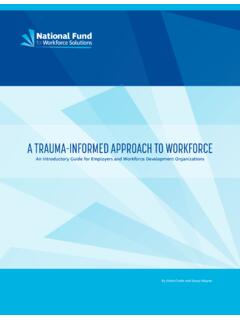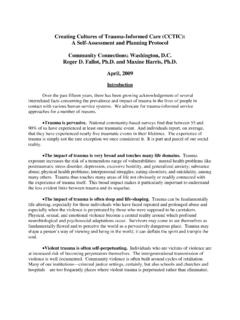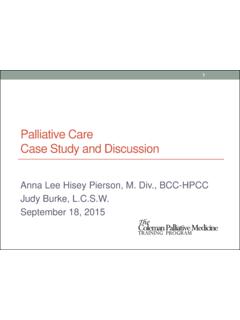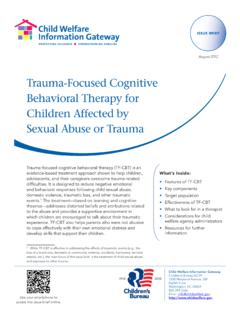Transcription of Therapeutic Approaches to Trauma Informed Care
1 Therapeutic Approaches to Trauma Informed care Georgetown University Center for Child & Human Development Today's Goals Describe Trauma and its disparate impact on people with ID. Identify tools for screening or assessing the impact of Trauma . Identify a number of therapy Approaches and how they may be modified to meet the individual's learning style and needs. Use info about Trauma screening and therapy methods to refine supports for direct support staff in treating people with histories of Trauma . Definition of Trauma Trauma results from an event or series of events experienced by an individual as physically or emotionally harmful and has lasting adverse effects on the individual's neurological, emotional, physical, spiritual and cognitive function.
2 There are many types of traumatic events, and we often think of sexual abuse, physical injury, neglect, isolation, trafficking, homelessness, and disability. Common Sources of Trauma Among People with IDD. Abuse &. Neglect Bullying & Medical Rejection Issues Source Seclusion Sexual &. Restraint Violence Grief &. Loss How Common is Trauma Among People with IDD? 70% to 100%. This compares to about 40% nondisabled peers. Vulnerable Can't Report Why? Isolated Not Valued What are Common Responses to Trauma Among People with IDD? Identify Change from Baseline Case Examples Related to Untreated Trauma Numerous Types of Impacts Neurological Emotional Physical Cognitive Behavioral Others such as Relationships, Family Impact of Trauma : Neurological Impact of Trauma : Emotional Depressed Frustrated Relief Numb Grief Shame Anger Fear Dissociate Impact of Trauma : Physical Headache Insomnia Fatigue Dizzy Heart Gynecology Muscle Spasms Blurred Vision STD.
3 STI. Impact of Trauma : Cognitive Feeling Stuck World Perception Confused Pre- Occupied Flashbacks Can't Easily Concentrate Startled Hyper Alert Indecisive Impact of Trauma : Behavioral Self-Harm Thrill Seeking Aggression Avoid Hyper Others Sexual Gambling Property Misuse Runaway Impulsive 5 Symptom Areas in Trauma -Related Disorders Intrusion Mood Dissociation Avoidance Arousal Nightmares Sad Dazed Distract self Poor sleep Poor sleep Depressed Slowed down Isolate Nightmares Flashbacks Grouchy Outside self Lash out Vigilant Feel Distressed Anxious Poor memory Runaway Startle easily Expression of Traumatic Symptoms Vary Among People with IDD.
4 Typical Symptom But Might Look Like .. A. Hyperarousal A. Agitation/Destruction B. Hypervigilance B. Obsessive Behavior C. Mistrust C. Paranoia D. Disassociation D. Noncompliance E. Fight Response E. Aggression F. Flight Response F. Escape Behavior G. Freeze Response G. Shut Down . Disorders Linked to Trauma Acute Stress Disorder: Some, but not all, of the main symptom types of intrusion, negative mood, dissociation, avoidance and arousal. Post-traumatic Stress Disorder: Symptoms similar to Acute Stress Disorder, but persists longer than 2 to 4 weeks.
5 Becomes a main feature of the individual's life. Co-Occurring Disorders: Individuals with ASD or PTSD usually have other disorders at the same time, such as substance abuse disorders, mood disorders, eating disorders, and personality disorders. But Diagnoses Often Missed . Reduced verbal skills and range of affect Non-specific symptoms Exacerbation of old symptoms Atypical symptoms Screening & Assessing Trauma Screen for history of exposure to traumatic events. Conduct in a safe, non-threatening environment. Give the client as much control as possible.
6 Use self-administered checklists if possible. Therapists need to be aware of own emotional responses. Use grounding techniques during assessment. Follow up with differential assessments if indicated. Screening & Assessing Trauma SCREENING. Not Equal to DIAGNOSIS. The following are Screening tools, NOT Diagnostic tools. If there is indication of an underlying disorder, a comprehensive evaluation may be needed for differential diagnosis and for treatment planning Samples of Trauma Screening Instruments Primary care PTSD Screen Stressful Life Experiences Screen Trauma Exposure Screening Tool (TEST).
7 PTSD Checklist Resilience Scale for Adults Mood and suicidality screenings Primary care PTSD Screen 4 Questions In your life, have you even had an experience that was so frightening or upsetting that during the past month, you Yes No 1. Had nightmares about it or thought about it when you did not want to? 2. Tried hard not to think about it or went out of your way to avoid situations that reminded you of it? 3. Were constantly on guard, watchful, or easily startled? 4. Felt numb or detached from others, activities or your surroundings?
8 Stressful Life Experiences Screen 13 Questions The items below refer to events that may have taken place Yes No at any point in your entire life, including early childhood 1. Have you ever had a life-threatening illness? 2. Were you ever in a life-threatening accident? 3. Was physical force or a weapon ever used against you in a robbery or a mugging? 4. Felt numb or detached from others, activities or your surroundings? Trauma Exposure Screening Tool 32 Questions The items below refer to events that may have taken place Yes No at any point in your entire life, including early childhood 1.
9 Has anyone made you to do something sexual when you did not want to? Did anyone ever offer you food, money or a place to sleep to have sex? 2. Has anyone taken your money without permission? 3. Has anyone ever hit, punched, kicked, choked or abused you? 4. Have people ever said things that really hurt your feelings or left you out of activities for a long time? PTSD Checklist 20 Questions Below is a list of problems and complaints that people Yes No sometimes have in response to stressful experiences 1. Repeated, disturbing memories, thoughts or images of stressful experiences?
10 2. Repeated, disturbing dreams of a stressful experience? 3. Suddenly acting or feeling as if a stressful experience were happening again (as if you were reliving it)? 4. Feeling very upset when something reminded you of a stressful experience? Resilience Scale for Adults 10 Questions Below is a list of problems and complaints that people Yes No sometimes have in response to stressful experiences 1. I am able to adapt when changes occur. 2. I can deal with whatever comes my way. 3. Having to cope with stress makes me stronger.







